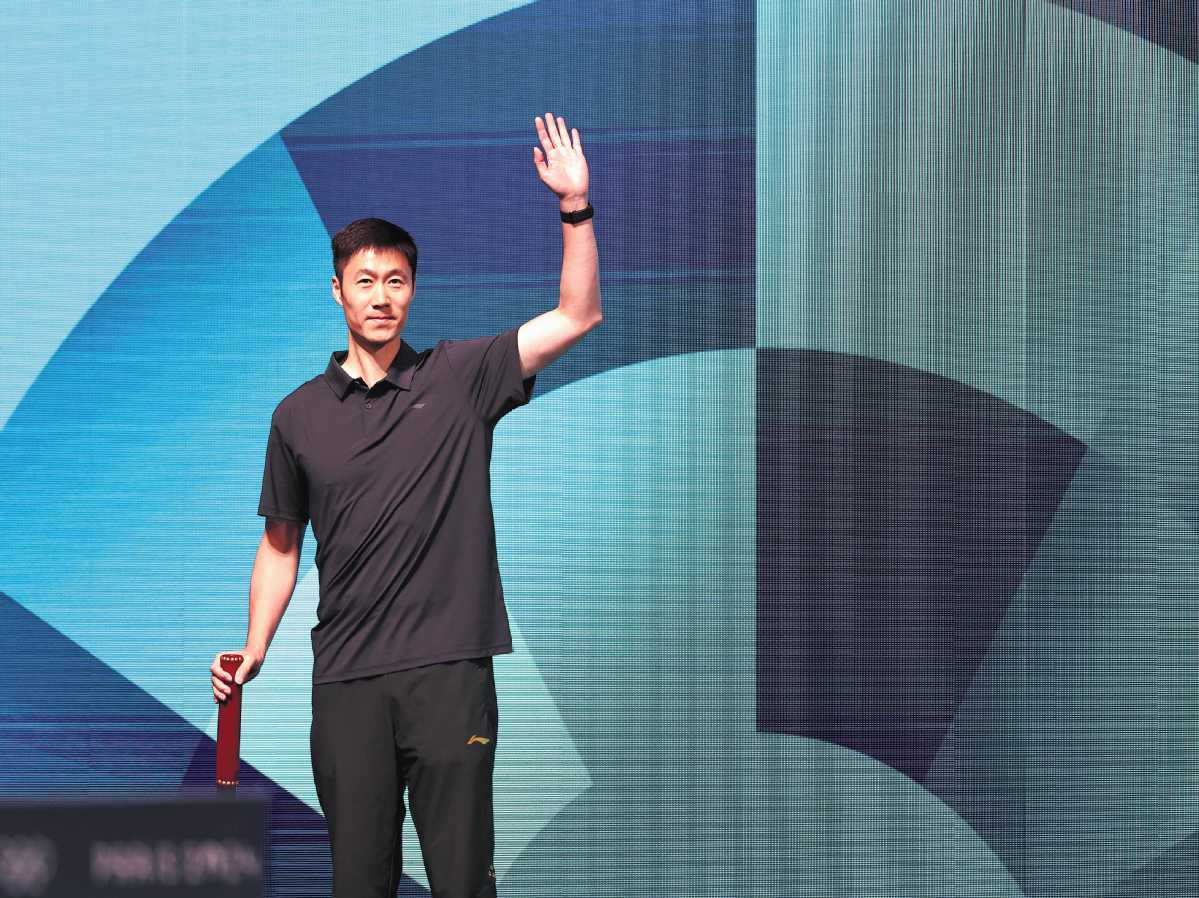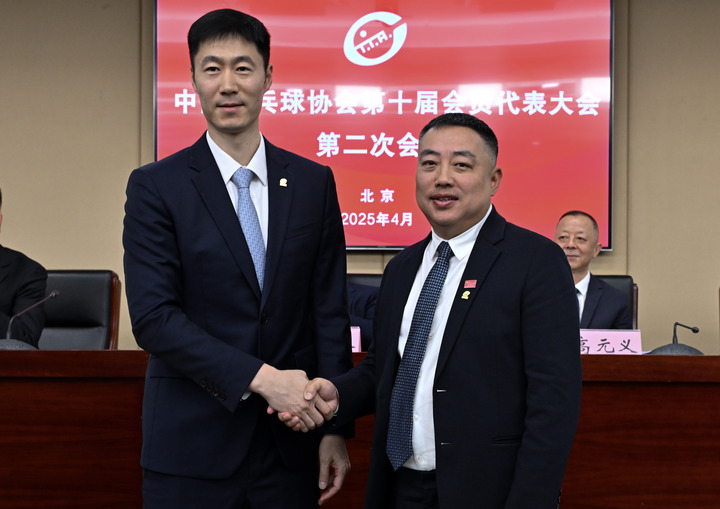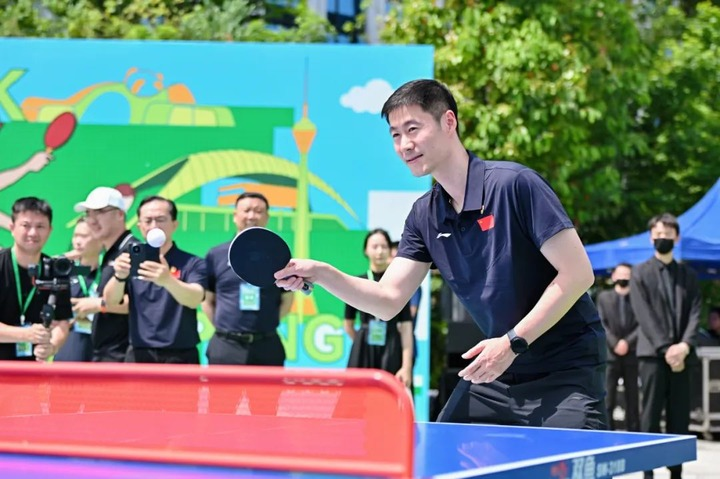
Barely two weeks into his new role as chairman of the Chinese Table Tennis Association, Wang Liqin is already setting the tone for a fresh chapter in the nation's storied legacy in the sport.
On May 2, at Chengdu's Chengdong Sports Park, the 46-year-old former world champion appeared alongside the national team — players and coaches alike — for a public, interactive table tennis event, marking his first major outing since assuming his new post.
But, before the event began, Wang made a quiet, yet telling, decision: He declined all media requests to interview individual players. Instead, he emphasized that the team was appearing as a united collective.
It was a symbolic move — and perhaps the first visible sign of the cultural reset Wang intends to lead, one that prioritizes team spirit over celebrity, discipline over fandom.
This shift comes at a pivotal moment. On April 23, during the second session of the 10th Member Congress of the Chinese Table Tennis Association held in Beijing, Chinese table tennis icon Liu Guoliang officially stepped down from his post, handing over leadership to Wang. The transition arrives at the dawn of a new Olympic cycle, offering a clean slate for the nation's strategy, preparation and vision for the sport.
Wang assumes the chairmanship with a formidable legacy of his own. A three-time world singles champion, and a key figure in China's golden era of table tennis, his deep roots in the sport lend him both credibility and insight.
Storied career
During his playing career, Wang claimed 16 world championship titles and, alongside teammates Ma Lin and Wang Hao, helped usher in a golden era for Chinese table tennis.
After retirement, both Ma and Wang Hao transitioned into coaching, and now guide the national team. Wang Liqin, however, chose a different path — one that was more centered around the sport's administration.
He began as assistant director of the Shanghai Table Tennis and Badminton Center, later rising to director. In 2018, he was appointed vice-chairman of the CTTA, before eventually assuming the role of chairman last month.
When elected president of the 11th Council of the Shanghai Table Tennis Association, Wang emphasized the importance of grounded leadership: "Only through research can we earn the right to speak. Solving real problems starts with investigation and study — then we can craft specific strategies to tackle key challenges," he said.
"The same applies to the work of the association: We must listen more to table tennis enthusiasts, and learn from their feedback and ideas. That way, our policies will be targeted and effective, not just impulsive decisions made in a vacuum."

But, with glory comes responsibility. China's table tennis legacy now demands not just preservation, but evolution — with foresight and finesse.
His immediate task is preparing for the 2028 Los Angeles Olympics, where changes to the competition format require some strategic recalibration.
Internally, he must manage a generational shift — nurturing emerging talent, while guiding veterans through the transition. Externally, rivals like Japan, Germany and Brazil are gaining ground, with their athletes increasingly capable of challenging China's dominance.
Yet, one of Wang's most pressing, and perhaps most delicate, tasks lies off the court — addressing the growing influence of "fan culture" in Chinese table tennis.
In recent years, the celebrity of individual players — often bordering on idolatry — has sparked concerns about distractions, undue pressure and the erosion of collective discipline.
Wang Liqin's approach seems clear: to re-center the team as a whole, reinforcing humility, and place national pride above personal fame.
His leadership style, grounded and team-oriented, reflects his own playing days — marked by consistency, composure, and an unshakable focus on the bigger picture.
Challenges ahead
As chairman, Wang now faces the challenge of turning those values into a cohesive vision. If his early actions are any indication, the future of Chinese table tennis may be less about spectacle and more about substance.
And that may be exactly what the sport needs.
"The Olympic preparation cycle for Los Angeles has already begun, and our next step will likely align all our training tasks with that goal," Wang Liqin said.
"In particular, the International Olympic Committee recently announced changes to the table tennis program in LA — expanding from five gold medals to six. We'll need to develop a corresponding strategy for all six events."
In early April, the IOC approved the introduction of a new mixed team event at LA28, and reinstated men's and women's doubles, replacing the current men's and women's team events.

The former was first tested at the 2023 Mixed Team World Cup in Chengdu, an event that emphasized gender equality and team collaboration — values that align closely with Wang's own vision for a more united Chinese team.
Last week, the Chinese national table tennis team wrapped up a 15-day closed training camp, and Wang will face his first test since taking office: the World Table Tennis Championships in Doha, Qatar, starting on May 17.
The team has already announced its lineup, sending its strongest possible roster in the absence of Olympic champions Ma Long, Fan Zhendong and Chen Meng.
Titles will be contested in mixed doubles, men's doubles, women's doubles, men's singles, and women's singles — all of which are part of the LA28 program.
The women's singles lineup is led by Sun Yingsha, the current world No 1 who is fresh off her victory at the ITTF Women's World Cup in Macao.
ALSO READ: China's Sun retains crown, Brazil's Calderano makes history
"With chairman Wang Liqin at the helm, I believe Team China will continue to dominate this new Olympic cycle — marching from one victory to the next," Sun said.
On the men's side, the singles roster is spearheaded by world No 1 Lin Shidong and No 2 Wang Chuqin.
At the recent ITTF Men's World Cup in Macao, Brazil's Hugo Calderano snapped China's winning streak in singles, defeating both of them en route to the title — ramping up the pressure on the Chinese men to deliver a winning performance in Doha.
Although Wang Liqin never completed the coveted "Grand Slam" — having missed out on a World Cup title during his playing days — his track record at the world championships is illustrious: three men's singles titles, one men's doubles title, and one men's team championship.
Perhaps at this upcoming world championships, he will draw from that wealth of experience to guide his players in writing the next glorious chapter in Chinese table tennis history.


